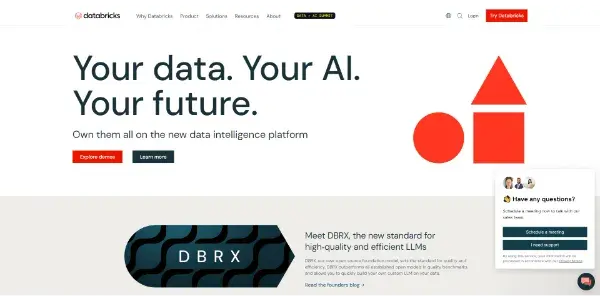Databricks

Easily develop AI applications with your data. Enable everyone to obtain accurate information while reducing your costs
Databricks: Accelerating AI Development and Deployment
Databricks is a unified analytics platform that simplifies the development and deployment of AI applications. It empowers organizations of all sizes to leverage their data for more accurate insights, faster innovation, and reduced operational costs. By bringing together data engineering, data science, and machine learning workflows in a single environment, Databricks significantly streamlines the AI lifecycle.
What Databricks Does
Databricks acts as a central hub for your entire data and AI pipeline. It allows you to:
- Ingest and prepare data: Easily import data from various sources (databases, cloud storage, streaming platforms) and cleanse, transform, and prepare it for machine learning.
- Build and train models: Develop and train machine learning models using popular libraries like TensorFlow, PyTorch, and scikit-learn, leveraging the power of distributed computing.
- Deploy and manage models: Deploy trained models into production, monitor their performance, and manage model versions efficiently.
- Collaborate effectively: Facilitate seamless collaboration between data engineers, data scientists, and business analysts through a shared workspace.
- Scale effortlessly: Scale your AI workloads seamlessly to accommodate growing data volumes and increasing model complexity.
Main Features and Benefits
Databricks offers a rich set of features that contribute to its effectiveness:
- Unified Platform: A single platform for the entire data and AI lifecycle eliminates the need for multiple tools and reduces integration complexities.
- Scalable Computing: Leverage the power of Apache Spark for distributed computing, enabling efficient processing of large datasets.
- Collaboration Tools: Built-in collaboration features promote seamless teamwork and knowledge sharing.
- Pre-built Libraries and Integrations: Access a wide range of pre-built libraries and integrations with popular data sources and AI tools.
- Automated Machine Learning (AutoML): Simplify model development with automated features that handle tasks like feature engineering and model selection.
- MLOps Capabilities: Streamline the deployment, monitoring, and management of machine learning models in production.
- Strong Security and Governance: Robust security features protect sensitive data and ensure compliance with regulations.
Use Cases and Applications
Databricks finds applications across various industries and domains:
- Customer Churn Prediction: Build predictive models to identify customers at risk of churning and implement proactive retention strategies.
- Fraud Detection: Develop real-time fraud detection systems using streaming data analysis and machine learning.
- Personalized Recommendations: Create personalized recommendations for users based on their past behavior and preferences.
- Predictive Maintenance: Predict equipment failures and optimize maintenance schedules to reduce downtime and costs.
- Supply Chain Optimization: Optimize logistics and inventory management through predictive modeling and data analysis.
- Chatbot Development: Build and deploy intelligent chatbots using natural language processing (NLP) capabilities.
Comparison to Similar Tools
Databricks competes with other cloud-based data analytics platforms like AWS SageMaker, Google Cloud AI Platform, and Azure Machine Learning. However, Databricks distinguishes itself with its unified approach, focusing on a single platform for the entire data and AI pipeline, making it particularly appealing for organizations requiring seamless integration between data engineering and machine learning. Other platforms often require more manual integration between different services. Databricks' strong community support and open-source foundation also contribute to its competitive advantage.
Pricing Information
Databricks operates on a paid subscription model. Pricing varies depending on the specific features required, the compute resources utilized, and the volume of data processed. Detailed pricing information is available on the Databricks website, and custom quotes are often provided for enterprise-level deployments. It's important to note that a free trial is typically available to allow for exploration and experimentation before committing to a paid subscription.
Conclusion
Databricks provides a powerful and comprehensive platform for accelerating AI development and deployment. Its unified approach, scalability, and extensive features make it an attractive option for organizations seeking to leverage the full potential of their data for improved decision-making and competitive advantage. The platform's ease of use and strong community support further enhance its appeal for both experienced data scientists and those new to the field.